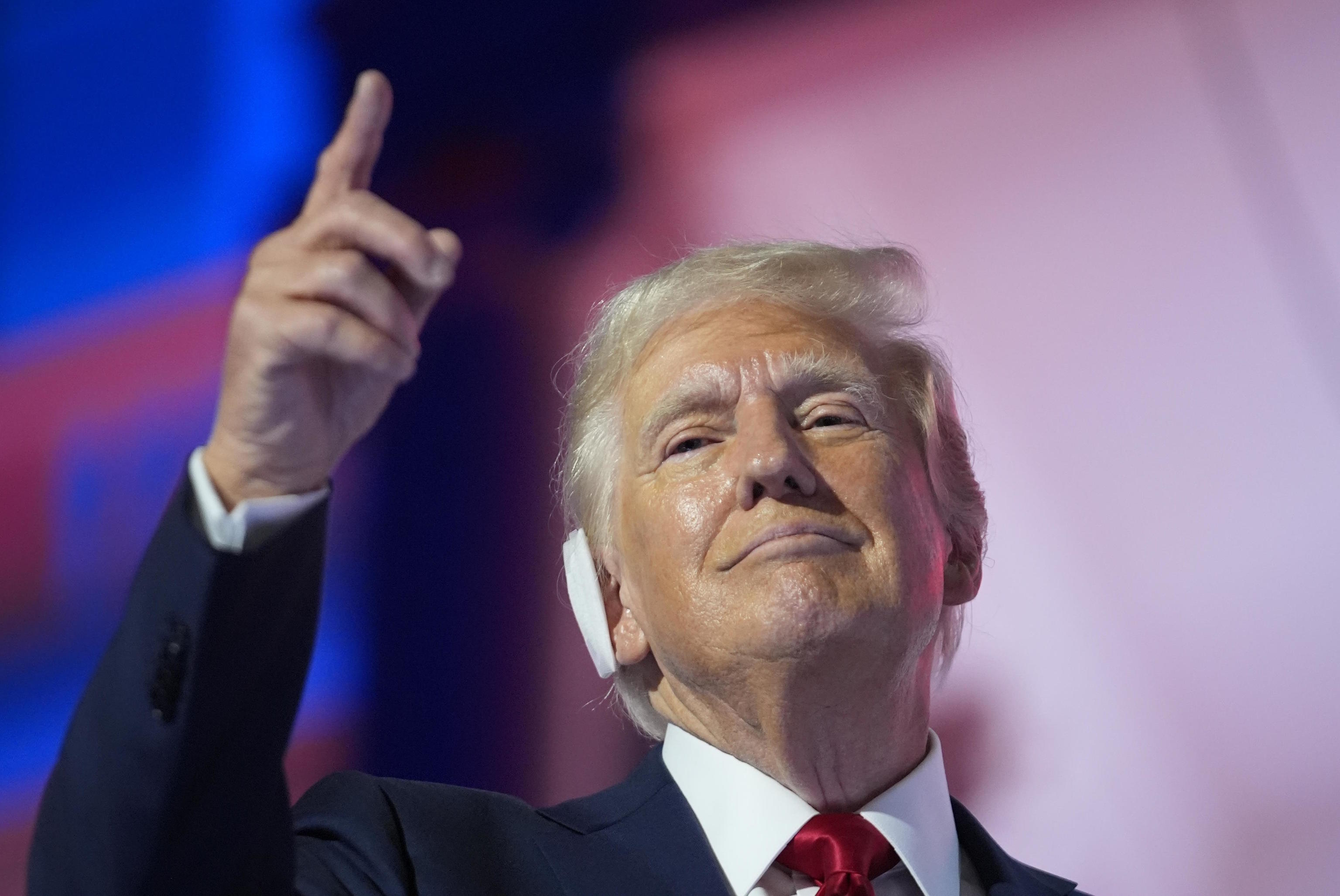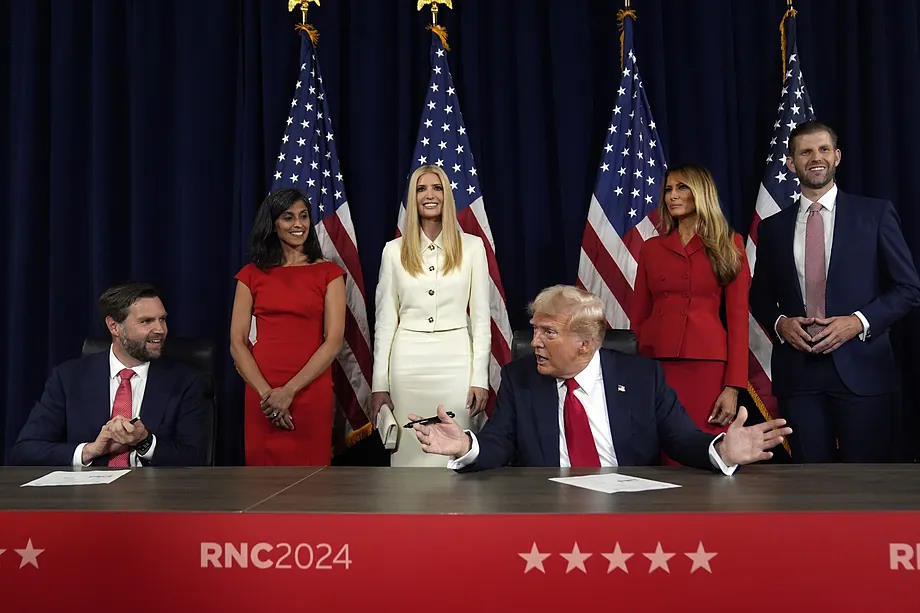Full capacity for the first time all week, electrifying energy in the pavilion, and an emotion more akin to a sports, music, or religious event than a political gathering. The closings of the national conventions of the two major American parties are always a spectacular, intense, and televised moment as only this country can conceive them. With live music, anthems, soldiers, and tributes. With thousands of tricolor balloons, the revered national flag, and epic rhetoric worthy of Oscar-winning movies. But the final act on Thursday was undoubtedly something special, with the great speech by Donald Trump, the acceptance of his party's nomination, the ratification as the undisputed and almost messianic leader of the Republican Party, but above all, the survivor of the first presidential assassination attempt in 43 years.
The chroniclers of the last decade speak of decisive moments in Trump's political career. His first rally, his first acceptance speech, the first address to Congress. Tonight's will surely be part of that category due to the symbolism, the initial tone, and what it represents, more than the content. The world is accustomed to vitriolic, overwhelming, and destructive Trump. To the force of nature that speaks his mind without regard for tomorrow or yesterday, without the slightest attachment to truth or reality, but with a charisma that any attendee at his events must acknowledge. But neither the world nor the Republicans, the party, apparatus, and supporters, are accustomed to the most 'transcendental' version of the character.
The big question analysts were asking is whether the reconciling grandfather would appear, applauding with his grandson on his lap while his son spoke, as the campaign describes, or the leader of all angry and aggressive white men who took the stage before him, paradigms of masculinity that MAGA defends: muscles, weapons, confrontation. There was a bit of everything in his long, disjointed, and rather boring intervention. He tried to restrain himself for half an hour, but as time passed, his nature prevailed to the delight of a devoted and eager audience craving confrontation, not reconciliation. He started as a statesman, ended as a populist.
The start promised something new, with a call for unity, a "message of hope" because "society is divided and wounded and must be healed. As Americans, we are united by faith, a continuous destiny, either we walk together or we fall." And with a positive declaration: "I am running to be president of all of the United States, not just a part, because there is no victory in winning for half of the United States," he stated in his opening words.
Quickly, however, the truce ended, belittling Joe Biden or Kamala Harris, demanding that they stop using "Justice as a weapon" against him and reiterating the narrative that the elections were stolen from him. He called for cohesion, but behind his leadership as the only solution for a country on the brink of collapse and even "World War III." He encouraged not to "demonize" rivals while insulting them. And promised peace, but only if he wins. "We cannot allow this to continue, and we will not. Less than four years ago, we were a great nation, and we will soon be again," he said, criticizing the ongoing processes. "If they want to unite this country, the Democrats should close the cases before the elections," he urged.
Articles these days talked about a changed Trump, affected by being so close to death. His associates say he had moved away from outbursts, selfishness, to being "emotional, serene, and even spiritual," according to a Politico chronicle, one of the leading media outlets, which gathered impressions from those who have seen him privately since the attack. Critics said no, that it's all a facade, propaganda. That it's a way to whitewash the character and ride the wave, something that has been said many times, either by his team to reassure or by his detractors to deceive themselves.
The truth is that yesterday was undoubtedly the same as always, with his walls against the "migratory invasion" and his likes and dislikes, simply seeking new tones at times. Little spiritual, nothing transcendental, coherent, or concise. If the goal was to present his softer side, as was done with the vice president the night before, his campaign prepared well, but only for 25 minutes. After that, the usual chaos and delirium that his masses adore. If he had stopped in time, he would have been remembered very differently, especially by the undecided voters his campaign theoretically wanted to reach. But the scorpion cannot go against its nature.
"As you know, the assassin's bullet was a quarter of an inch away from taking my life. Many people have asked me what happened, and therefore, I will tell you what happened, and you will never hear it from me a second time because it is too painful to tell," he said at the beginning of his speech. All week he has been silent, downcast even. Serious, pensive, with his mind elsewhere from the VIP box where he listened to parts of the speeches each day, but no more.
The first 10 minutes of his speech were a first-person account of the assassination attempt,sober, with almost total silence, with absolute control of timing and resources, thanking God, the people, the Americans. His team wanted it to sound presidential, even putting an image of the White House in the background. He spoke very slowly, in a low voice, almost whispering while dozens of attendees and delegates cried in the front rows with the memory of the attack. Kissing a doll with a firefighter's helmet in honor of the man who died from a gunshot on Saturday and calling for a minute of silence. At times, it seemed contrived, too scripted, but the result could not have been better for his aspirations.
The second part, when he had been speaking for over half an hour, offered instead the usual version of Trump, the worst of them in fact. The homily was so long that from tears it turned to yawns, from revelry to tepid and tired applause. The longest acceptance speech on record, well over an hour and a half. And an anti-fatalism portion for the Democrats. After Biden's debacle, depression reigns among them, but after seeing this Trump, it is impossible for them not to think that there is a chance of victory, however small.
It was Donald who couldn't let go of the microphone, who couldn't stop, jumping senselessly from one topic to another, as if the computer had short-circuited. Talking about his friends, but mostly about himself. Attacking the Democrats, exaggerating or inventing statistics (that illegal immigrants take 107% of new jobs), data, alleged successes. Rambling about the economy, the Middle East, or Venezuela and simplifying his policies: "stop the invasion and Drill, baby drill," referring to oil. Insulting the "crazy Nancy Pelosi" just after asking not to "demonize rivals." Promising tariffs and tax cuts. Any resemblance between the reality and the world and the past that Trump described while improvising was purely coincidental. It didn't matter. He had them all in his pocket, he knew it, and he conveyed it, even without being funny or original.
While his rivals are in the worst internal crisis in decades, the Republicans are united, they are energized, and the festive spirit spread in all directions. He once said he could shoot someone on the street and nothing would happen to him. Now, after surviving that same scenario, the feeling that indeed he could do anything amidst even louder cheers.
Entertainment World Warm-Up Acts
Trump had his moment reserved at 9:00 p.m. local time. The day's program was much weaker, with second or third-tier speakers, including employees from his golf courses. Famous faces like country star Jason Aldean and his wife Brittany, or the indefinable Jared Leto roamed the pavilion halls in search of cameras.
But after a lackluster afternoon, the last hour was different, with heavyweights but not from the political realm. Trump did not want congressmen, senators, or governors, but very different faces. A selection that covers almost all angles and helps understand the new Republican Party being built in the image and likeness of its leader, but undoubtedly by his side.
Tucker Carlson, the former Fox star presenter who now goes solo and who a few months ago interviewed Vladimir Putin in Moscow. The great media reference for conservatives in general and the MAGA movement in particular who praised the president, fiercely criticized aid to Ukraine, calling it "an insult and a middle finger to Americans who can't make ends meet."
There was Hulk Hogan, the wrestling star of the 1980s, putting on a first-rate show and doing what everyone in the audience expected: ripping off and tearing up his T-shirt to show another one underneath with the names of Trump and J.D. Vance, his vice presidential candidate. Dana White, the face of Mixed Martial Arts. The singer Kid Rock, with a song ad hoc for the party, inviting the attendees to fight ("fight, fight, fight") as Trump usually asks and as he asked with his fist raised on the day of the attack.
They were followed by Pastor Franklin Graham, son and heir of Billy Graham, the man courted by every president since Eisenhower. Perhaps the most important evangelical preacher of the 20th century in America, the spiritual and moral leader of a movement that is now decisive and completely and blindly overturned with Trump and the most religious and nationalistic version possible.
And the family. If on the eve it was Don Jr. and his daughter Kai, Trump's granddaughter, who took the stage, this time it was Eric's turn, while a few meters away his siblings, Melania Trump, Ivanka and her husband Jared Kushner listened to him. All together for the first time. With a furious intervention, full of anger for the judicial processes, of threats, of proclamations against "the elections or the judicial system, in which we no longer trust".
But with that order, that hierarchy, the Trumps launched the most important message in internal reading: the media and propagandists matter. Big figures like Hogan or Dana White, the president of the most important Mixed Martial Arts business, two conservative voting grounds, matter. The evangelical side matters a lot, and even more if Trump wants to cultivate that side of a man of faith he never had. But above all, first and foremost, by a long way, is family. His family. The one that has control of the stage, of the party, and if all goes well, of the country for the next decade as well.

